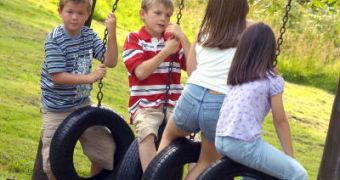Scientists have argued for a long time that one of the basic components of an individual's self-esteem is their satisfaction of the way they look. Unfortunately, as today's beauty standards are promoted very aggressively, even children feel more and more compelled to look like the artificial beauties in Hollywood, oblivious to the fact that it's only Botox and other similar products that keep some of the top-rated stars going.
A recent scientific study has revealed that kids who are dissatisfied with their appearance are very likely to be ridiculed and bulled by others in their peer group, which only goes to further lower their levels of self-esteem. Unfortunately, because the small ones are subjected to cultural influences since they're born, some of them grow up believing that they will never be as good as some of their favorite stars on TV or in the movies.
Over the years, these children and teens lose sight of the fact that it's their own beauty they need to emphasize, and not that of some random actor or musician. And largely responsible for this state of affairs are, at time, parents, who promote the idea that their kids need to look like someone from the shows or the magazines, who has had numerous plastic surgeries and Photoshop “additions.”
As a result of this fact, it's nowadays the rule that youngsters are not pleased with their bodies, rather than the exception. In a study of more than 1,000 kids, aged 10 to 14, Swedish researcher Carolina Lunde, from the University of Gothenburg, shows that the children with the lowest levels of self-esteem and satisfaction in regard to their bodies are those who constantly receive negative comments from their peers, but, most of all, their parents.
The researcher says that this age, in the early teens, is especially crucial for the little ones, as this is the time when they form their most long-lasting opinion of their bodies and their selves. If they are constantly subjected to mean remarks from their peers and their parents, then it would stand to reason that they are very likely to go into early adulthood believing what other people say.

 14 DAY TRIAL //
14 DAY TRIAL //